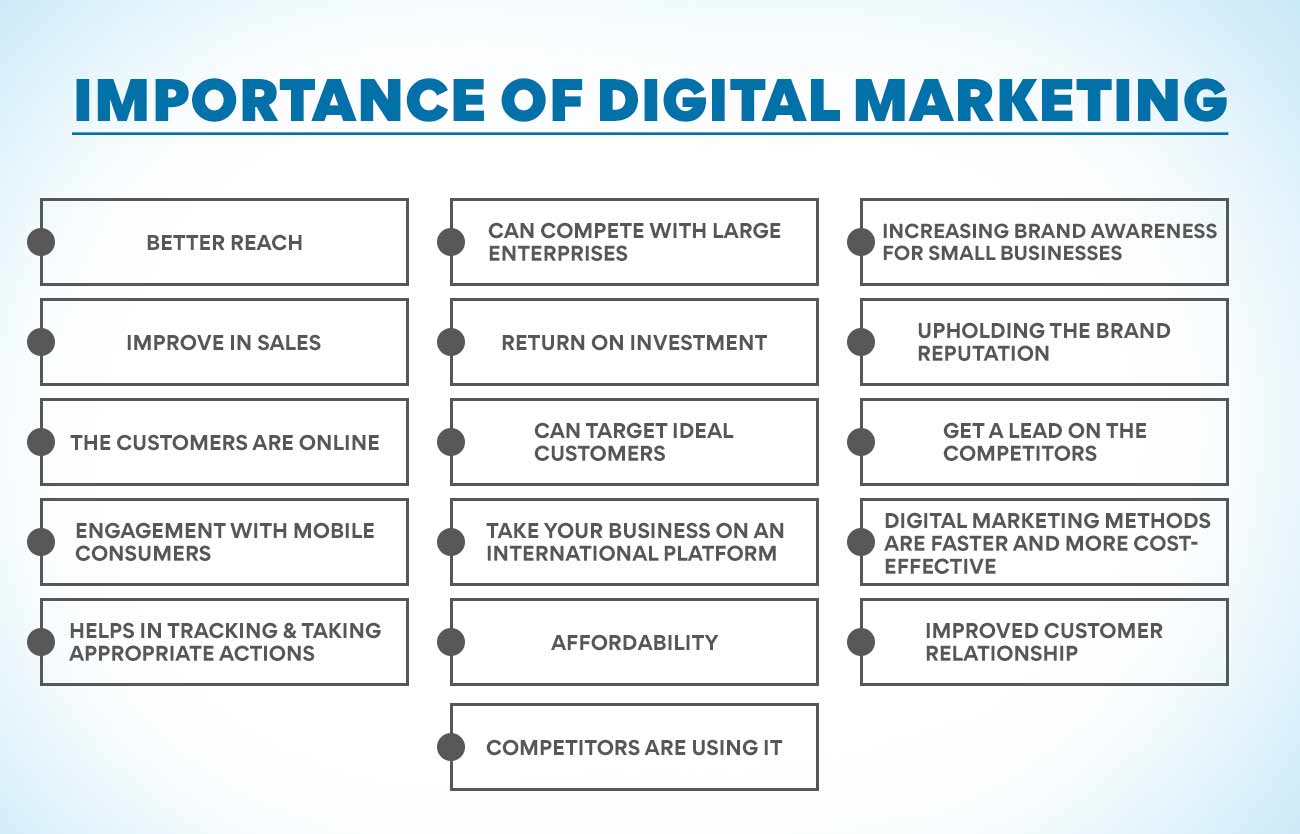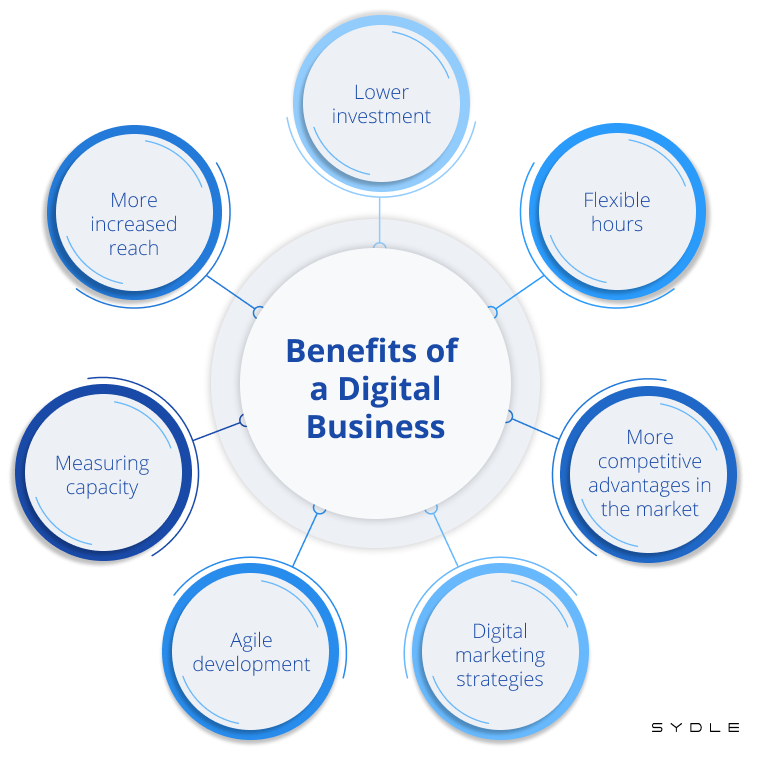Digital business is crucial for staying competitive and reaching a global audience. It enhances customer engagement and streamlines operations.
In today’s rapidly evolving market, digital business has become a necessity. Companies leverage digital tools to improve efficiency and provide better customer experiences. Online platforms enable businesses to reach a wider audience, breaking geographical barriers. Digital solutions like e-commerce, social media, and cloud computing offer cost-effective ways to operate.
They also facilitate real-time data analysis, helping businesses make informed decisions. Adopting digital practices helps in staying agile and responsive to market changes. Ultimately, digital business fosters innovation, driving growth and sustainability. Embracing digital transformation is essential for long-term success in the modern business landscape.
Rise Of Digital Business
The world is changing fast. One of the most important changes is the rise of digital business. Many companies are now online. This change brings new opportunities and challenges. Let’s explore the history and key drivers behind this shift.
Historical Context
Years ago, businesses relied on physical stores. People would go to these stores to buy things. The internet changed everything. In the 1990s, the internet became popular. Many businesses started online stores. This trend has continued to grow.
With the introduction of smartphones, digital business became even more important. Now, people can shop from anywhere. Businesses had to adapt to this new way of shopping.
Today, digital business is a key part of the global economy. Many businesses operate solely online. This shift has reshaped how companies operate and connect with customers.
Key Drivers
Several factors drive the rise of digital business. Let’s look at the most important ones:
- Technology advancements: New technologies make online businesses easier. Faster internet and better software help businesses grow.
- Customer behavior: People prefer shopping online. It’s convenient and saves time. Businesses must meet these new customer demands.
- Global reach: Online businesses can reach customers worldwide. This opens up new markets and growth opportunities.
- Cost efficiency: Running an online store can be cheaper. Businesses save on rent and other physical store expenses.
- Data analytics: Digital businesses can collect and analyze data. This helps them understand customers better and improve services.
Benefits Of Digital Transformation
Digital transformation is changing businesses. It offers many advantages. Companies can streamline processes, cut costs, and enhance customer experiences. Let’s delve into the benefits.
Increased Efficiency
Digital tools automate repetitive tasks. This saves time and reduces errors. Employees can focus on important work, boosting productivity.
| Traditional Method | Digital Transformation |
|---|---|
| Manual data entry | Automated data processing |
| Paper-based records | Cloud storage |
| Physical meetings | Virtual meetings |
Data is stored digitally, making it easy to access. Decision-making becomes faster and more accurate. Workflow automation leads to fewer mistakes.
Enhanced Customer Experience
Customers expect quick responses. Digital tools help businesses respond faster. They offer personalized experiences using data insights.
- Chatbots provide instant support.
- CRM systems manage customer interactions.
- Mobile apps offer convenience.
Businesses can understand customer needs better. This results in higher satisfaction and loyalty. Personalized marketing increases engagement and sales.
Technologies Enabling Digital Business
Digital business thrives on modern technologies. These technologies help businesses grow and stay competitive. Two main technologies are cloud computing and artificial intelligence.
Cloud Computing
Cloud computing stores data and applications online. This means businesses can access them anytime, anywhere. It makes sharing and collaboration easy. With cloud computing, you save on hardware costs. You also get high security and reliability.
Here are some key benefits of cloud computing:
- Scalability: Easily add or remove resources as needed.
- Cost-effective: Pay only for what you use.
- Accessibility: Access your data from any device.
- Security: Keep your data safe with advanced security features.
- Collaboration: Work with your team from anywhere in the world.
Artificial Intelligence
Artificial intelligence (AI) helps in decision-making and automating tasks. AI can analyze large amounts of data quickly. It helps businesses understand customer behavior and preferences. AI-powered chatbots provide 24/7 customer support.
AI offers several benefits:
- Efficiency: Automate repetitive tasks and save time.
- Insights: Gain valuable insights from data analysis.
- Personalization: Offer personalized experiences to customers.
- Support: Provide instant support with AI chatbots.
- Innovation: Develop new products and services using AI technologies.
Both cloud computing and AI are essential for digital businesses. They offer unique advantages and drive growth. Embracing these technologies can lead to success in the digital age.

Credit: cobaltzebra.medium.com
Digital Marketing Strategies
In today’s digital age, businesses must adopt effective digital marketing strategies to stay competitive. These strategies help reach a broader audience, boost brand visibility, and increase sales. Below, we explore two essential components of digital marketing: social media marketing and SEO and content marketing.
Social Media Marketing
Social media platforms are powerful tools for businesses. They allow direct interaction with customers. Here are key benefits of social media marketing:
- Increases brand awareness
- Boosts customer engagement
- Drives website traffic
To start, identify the platforms your audience uses. Create engaging content tailored to each platform. Use visuals like images and videos to capture attention. Employ social media ads to target specific demographics.
Seo And Content Marketing
SEO and content marketing are crucial for online visibility. SEO improves your website’s ranking on search engines. Content marketing involves creating valuable content to attract and retain customers.
Here are some SEO tactics:
- Use relevant keywords in your content
- Optimize meta tags and descriptions
- Ensure your website is mobile-friendly
Content marketing includes:
- Blog posts
- Infographics
- E-books
High-quality content keeps users engaged. It also helps build trust and authority. Regularly update your content to stay relevant. Combine SEO and content marketing for maximum impact.
Challenges In Digital Transformation
Digital transformation is essential for modern businesses. It brings many benefits. But, it also comes with challenges. Understanding these challenges helps businesses prepare better.
Data Security
Data security is a top concern in digital transformation. Businesses collect and store large amounts of data. Protecting this data is crucial. Cyber-attacks are becoming more frequent. Hackers target sensitive information.
Companies must invest in strong security measures. Encryption, firewalls, and secure networks are essential. Regular security audits help identify vulnerabilities. Training employees on security practices is also important.
Change Management
Change management is another major challenge. Digital transformation requires changes in processes and culture. Employees may resist these changes. Proper planning can ease this transition.
Involving employees in the process is key. Clear communication helps them understand the benefits. Providing training and support can reduce resistance. A step-by-step approach ensures a smoother transition.
| Challenge | Solution |
|---|---|
| Data Security | Invest in encryption, firewalls, and training |
| Change Management | Involve employees, communicate clearly, and provide training |

Credit: www.edureka.co
Case Studies Of Digital Success
The digital world has revolutionized how businesses operate. Let’s explore some remarkable case studies of digital success to understand the importance of going digital.
E-commerce Giants
Many e-commerce companies have shown tremendous growth by leveraging digital strategies.
- Amazon: Started as an online bookstore. Now, it sells almost everything. Its digital prowess includes personalized recommendations and speedy deliveries.
- Alibaba: Dominates the Chinese e-commerce market. Uses big data to understand customer behavior and improve user experience.
Both companies have successfully used digital tools to grow exponentially.
Traditional Businesses Going Digital
Traditional businesses also benefit greatly from going digital.
- Walmart: Adopted digital strategies to compete with e-commerce giants. Launched an online store with a focus on seamless user experience and quick delivery.
- Starbucks: Implemented a mobile app for easy ordering and rewards. The app enhances customer loyalty and simplifies the purchase process.
These businesses show that digital transformation is possible and profitable for traditional companies.
Overall, these case studies highlight the undeniable importance of digital business for growth and success.
Future Trends In Digital Business
As digital business evolves, new technologies are emerging. These future trends are shaping the way businesses operate. Let’s explore some key trends that will define the future of digital business.
Blockchain Technology
Blockchain technology is revolutionizing digital business. It offers secure and transparent transactions. This technology ensures data integrity and reduces fraud. Many industries are adopting blockchain for various applications.
- Supply Chain Management: Tracks goods from origin to delivery.
- Finance: Facilitates secure and quick transactions.
- Healthcare: Protects patient records and ensures data privacy.
Blockchain enhances trust among business partners. It creates a decentralized network. This means no single entity controls the data. Blockchain is also scalable. It can handle a large number of transactions.
Internet Of Things
The Internet of Things (IoT) connects everyday devices to the internet. This network allows devices to communicate with each other. IoT is making businesses smarter and more efficient.
| Sector | Application |
|---|---|
| Manufacturing | Monitors machinery and predicts maintenance needs. |
| Retail | Tracks inventory and manages stock levels. |
| Healthcare | Monitors patient health with smart devices. |
IoT devices collect and analyze data. This helps businesses make better decisions. IoT improves operational efficiency. It reduces costs and enhances customer experiences.
Steps To Implement Digital Transformation
Digital transformation is essential for businesses to stay competitive. It involves integrating digital technologies into all areas of a business. Let’s explore the steps to implement digital transformation efficiently.
Developing A Strategy
Begin with a clear strategy. Define your goals and objectives. Understand what you want to achieve. This step will guide your digital transformation journey.
- Analyze your current state.
- Identify key areas for improvement.
- Set measurable goals.
Use data to make informed decisions. This ensures your strategy is data-driven. Engage your team in the planning process. Their input is valuable.
Measuring Success
Track your progress and measure success. Use KPIs to gauge performance. Regularly review and adjust your strategy.
| Key Performance Indicator (KPI) | Importance |
|---|---|
| Customer Satisfaction | Indicates how well you’re serving customers. |
| Operational Efficiency | Measures the effectiveness of new processes. |
| Revenue Growth | Shows the financial impact of transformation. |
- Set clear KPIs.
- Regularly review performance.
- Adjust plans based on data.
Use tools and software to track metrics. This ensures accurate and real-time data. A successful digital transformation relies on continuous improvement.

Credit: www.sydle.com
Frequently Asked Questions
What Is The Significance Of Digital Business?
Digital business leverages technology to streamline operations, enhance customer experiences, and drive growth. It enables global reach, real-time data analysis, and cost efficiency. Adopting digital practices improves competitiveness and innovation in the marketplace.
What Are The Benefits Of Digitization In Business?
Digitization in business boosts efficiency, reduces costs, and enhances customer experience. It enables better data management and supports remote work.
What Are The Advantages Of Digital Business Model?
A digital business model reduces costs, enhances customer reach, and improves operational efficiency. It offers scalability and flexibility. Businesses can leverage data analytics for better decision-making. Digital platforms also enable personalized customer experiences and continuous innovation.
What Is Digital Business?
A digital business leverages technology to create value, streamline operations, and deliver innovative customer experiences. It integrates digital tools, platforms, and data to enhance business processes and drive growth.
Conclusion
Embracing digital business strategies is crucial for success. It enhances efficiency, expands market reach, and improves customer engagement. Stay ahead by adopting innovative technologies. Digital transformation is not an option but a necessity. Start today to secure a prosperous future for your business.
Leverage digital tools and reap the benefits.